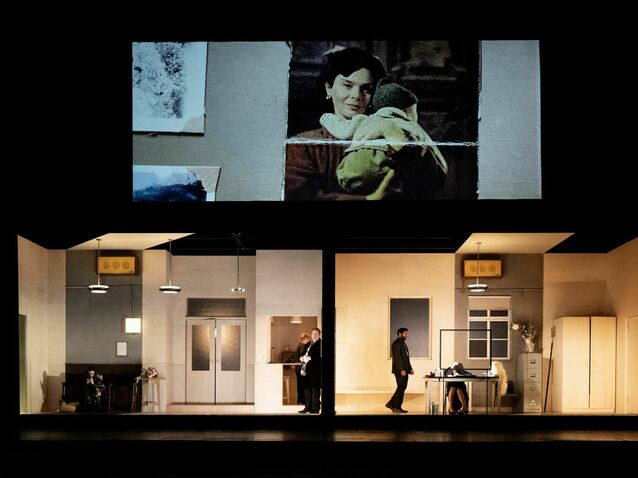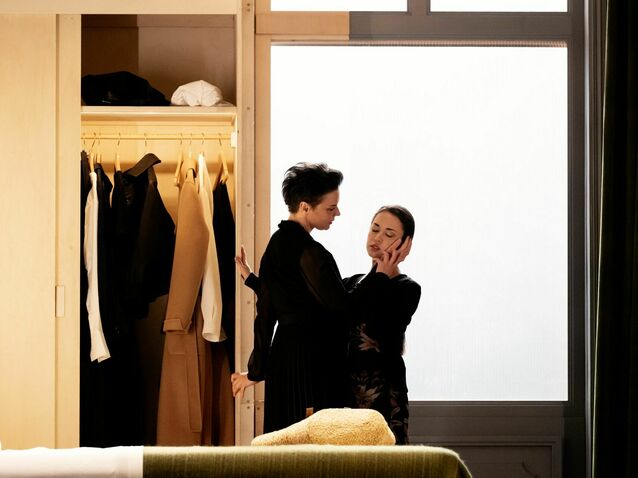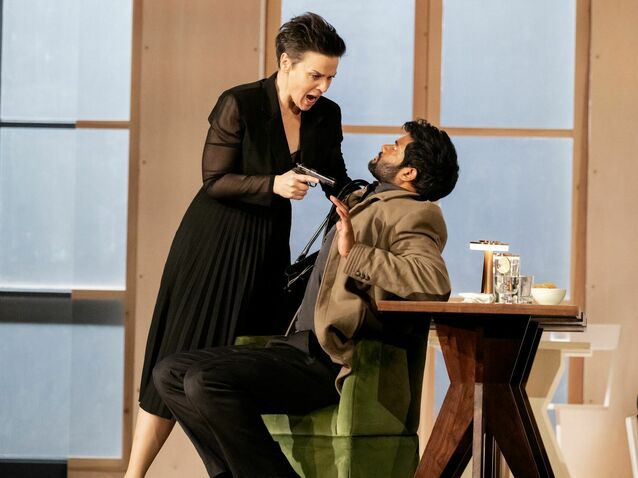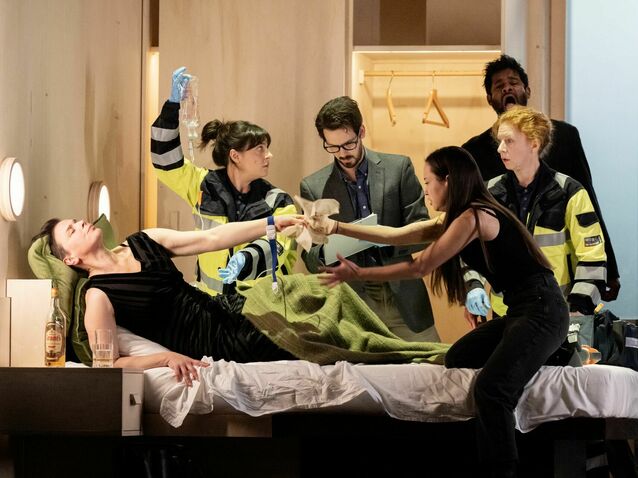 The Royal Opera ©2025 Camilla Greenwell
The Royal Opera ©2025 Camilla Greenwell
Composed between 1923 and 1925, The Makropulos Case, with music and libretto by Leoš Janáček, is based on Karel Čapek’s eponymous play. Originally set in Prague in 1922, it concerns a hundred year old probate case entitled Gregor v. Prus. When Baron Joseph Ferdinand Prus died in 1827 his cousin claimed the estate, but so too did one Ferdinand Gregor, who asserted that the Baron had promised it to him. While the people originally involved are long dead, their descendants, Baron Jaroslav Prus and Albert Gregor, are still fighting over the inheritance, with the lawyer Dr Kolenatý representing the latter. A famed singer Emilia Marty arrives and reveals a surprisingly detailed knowledge of the events from a century ago. She asserts that Ferdinand Gregor was the out-of-wedlock son of Baron Joseph and opera singer Ellian MacGregor, and claims to know where the Baron’s will is that would settle the case. It is subsequently found exactly where she said it would be, though it still needs to be proved that Ferdinand Gregor was the Baron’s illegitimate son.
Emilia’s primary interest, however, lies in another document that accompanied the will, and she is determined to gain possession of it. As she attempts to do so she sees Albert, Baron Jaroslav Prus’s son Janek and the ageing Count Hauk-Šendorf (who claims to see in her a woman called Eugenia Montez with whom he had had an affair fifty years ago) all become infatuated with her. Despite Janek even being driven to suicide by his love for her, Emilia shows a cold indifference towards them all. In the end, once she has obtained the document she sought, she admits the truth that she is Elina Makropulos, and over three hundred years old.
Born in 1585 to Hieronymus Makropulos, an alchemist in Emperor Rudolf II’s Court, she was given a potion that would extend her life after the Emperor commissioned such an elixir, but wanted to see it tested on someone else first. She has since lived an itinerant life and, to conceal her longevity, has assumed many identities, though each name she has taken has borne the initials E.M. She gave the formula to Baron Joseph, which became lost when he died, and she has resought it in order to gain three hundred more years of life, after feeling the original potion wearing off. She now realises, however, that perpetual youth has led to exhausted apathy, as can be seen in her lack of interest in everyone who surrounds her, and resolves to allow death to come naturally. Before she dies she offers the formula to Kristina, who had been in a relationship with Janek and is a young singer with dreams of her own, but what she chooses to do with it is another question altogether.

Ausrine Stundyte as Emilia Marty and Heather Engebretson as Krista in Katie Mitchell's The Makropulos Case, The Royal Opera © 2025 Camilla Greenwell
In Katie Mitchell’s new production for the Royal Ballet and Opera the action is brought forward to the present day. The dates of Elina’s birth and of Baron Joseph’s death, however, remain unchanged so that she is now over four hundred years old and the lawsuit has persisted for nearly two centuries. Vicki Mortimer’s set always consists of at least two spaces next to each other so that Act I reveals a hotel lobby, where Albert, Emilia and others meet with the lawyers, and a bedroom in the same building that Emilia has booked. From the start Emilia is shown to liaise with Kristina (named Krista in this instance) as she invites her to her room.
Mitchell decided to suggest a relationship between the pair because ‘if you’d lived for 300 years and your body was - as the characters say in the libretto - marked with all the scars of male violence, it may be quite natural that you would desire sexual and emotional relationships with women’. While it makes sense that Emilia, in her attempts to overcome the weariness that she feels, might seek out new connections such as this, and Mitchell’s desire to expose to the full the misogyny to be found in the story should be applauded, the approach is not without its problems.
Some of the difficulties are practical, as the Prelude is accompanied visually by Emilia linking up with Krista online. A series of messages that go between their phones are shown on a screen above the stage, courtesy of video designer Sasha Balmazi-Owen, and it ends with Krista going to Emilia’s bedroom. During Act I, as the legal case is discussed in the lobby, we see Krista now alone in the room going through Emilia’s possessions and texting her partner Janek photos of the items she plans to steal. This both distracts from the main action, and detracts from what we are supposed to be feeling. Janáček’s score does not see (until the end) much in the way of thematic development, with the mass of different motifs and ideas being deliberately designed to convey Emilia’s unsettling character. When the overload of activity undermines the music’s ability to take centre stage, our opportunities to connect with the main protagonist are adversely affected.

Ausrine Stundyte as Emilia Marty in Katie Mitchell's The Makropulos Case, The Royal Opera © 2025 Camilla Greenwell
The Makropulos Case sees a dry, dusty legal world become invaded by an enigmatic, almost supernatural, figure. Achieving the right balance between these two elements means doing full justice to the first of them, but all of Act I’s legal descriptions and affairs are totally overshadowed by what is going on in the other space. While the desire to focus on the women, and really see things from their point of view, is commendable, the purpose of giving Krista a larger role seems undermined by her using her greater agency, in part at least, to swindle Emilia.
Under normal circumstances, Emilia’s indifferent reaction to Janek’s suicide says much about her, but when, as in this production, his death does not result from him taking his own life it throws everything out of balance. Whether one believes he deserved his fate or not is irrelevant, because the point is that we see others carry out extreme actions. With guns being brandished at every opportunity, the indulgence in hyperbole feels antithetical to delving deep inside the characters. The impact of Emilia’s final ‘monologue’ is also marred by us not being able to focus entirely on her feelings, as paramedics advance and attend to her.

Ausrine Stundyte as Emilia Marty and Heather Engebretson as Krista in Katie Mitchell's The Makropulos Case, The Royal Opera © 2025 Camilla Greenwell
The evening still has much to commend it, and not only because this is the first time that the work has ever appeared at the Royal Opera House. It is impossible not to marvel at the sheer slickness of the execution, as the design, planning and timing of the production’s numerous actions, including the many text messages that are sent, is certainly impressive. Similarly, all of the activities require the performers to be strong actors, and Heather Engebretson as Krista stands out in this respect, as she also reveals a captivating soprano. If at times the freneticism can detract from the characters themselves, the cast members work well with what they are required to do, or at least prove strong enough to overcome many of the problems that such a hyperbolic approach presents.
Ausrine Stundyte is outstanding as Emilia Marty as, with her alluring soprano, she cuts through the ‘noise’ of the production to deliver a compelling performance. In fact, the cast can hardly be faulted as there are superb performances from Sean Panikkar as Albert Gregor, Johan Reuter as Baron Prus, Henry Waddington as Dr Kolenatý, Peter Hoare as Vítek, Daniel Matoušek as Janek and Alan Oke as Count Hauk-Šendorf. The conducting of Jakub Hrůša, Music Director of the Royal Opera, is nigh on perfect as it maximises on the disparate nature of, and contrasts to be found within, Janáček’s wondrous score, while still creating something akin to a smooth and coherent whole. When such strong musical credentials and performances combine with a staging that is slick, no matter how flawed one may judge it to be, the results are undoubtedly worthwhile.
By Sam Smith
The Makropulos Case | 4 - 21 November 2025 | Royal Ballet and Opera, Covent Garden
the 07 of November, 2025 | Print
Comments